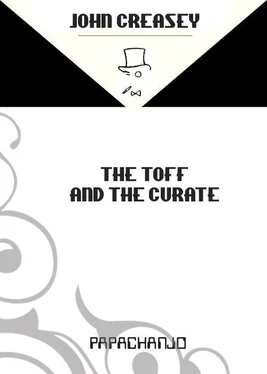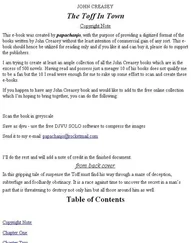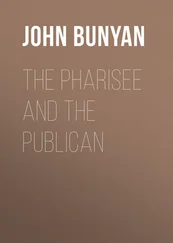John Creasey - The Toff And The Curate
Здесь есть возможность читать онлайн «John Creasey - The Toff And The Curate» весь текст электронной книги совершенно бесплатно (целиком полную версию без сокращений). В некоторых случаях можно слушать аудио, скачать через торрент в формате fb2 и присутствует краткое содержание. Жанр: Старинная литература, на русском языке. Описание произведения, (предисловие) а так же отзывы посетителей доступны на портале библиотеки ЛибКат.
- Название:The Toff And The Curate
- Автор:
- Жанр:
- Год:неизвестен
- ISBN:нет данных
- Рейтинг книги:5 / 5. Голосов: 1
-
Избранное:Добавить в избранное
- Отзывы:
-
Ваша оценка:
- 100
- 1
- 2
- 3
- 4
- 5
The Toff And The Curate: краткое содержание, описание и аннотация
Предлагаем к чтению аннотацию, описание, краткое содержание или предисловие (зависит от того, что написал сам автор книги «The Toff And The Curate»). Если вы не нашли необходимую информацию о книге — напишите в комментариях, мы постараемся отыскать её.
The Toff And The Curate — читать онлайн бесплатно полную книгу (весь текст) целиком
Ниже представлен текст книги, разбитый по страницам. Система сохранения места последней прочитанной страницы, позволяет с удобством читать онлайн бесплатно книгу «The Toff And The Curate», без необходимости каждый раз заново искать на чём Вы остановились. Поставьте закладку, и сможете в любой момент перейти на страницу, на которой закончили чтение.
Интервал:
Закладка:
“Stop that fighting!”
No one took the slightest notice.
“Strike me, I’ll see the lot of you in jail if—” roared the little man and plunged into the middle of the fray. He did not use his fists but pushed and shoved and shouted and out of the melee there came some sort of order. Before long, the combatants had separated and were standing away from each other. The Irish were grinning widely and there seemed to be no malice in the others.
The little dark-haired man gave orders and some of the dockers, from both sections, went towards an empty lorry and began to load it with wooden crates. Only a few of the men had restarted work, however, but Rollison paid little attention to that. He answered questions reassuringly for no great harm had been done. He smiled at the dark-haired man and at the English and the Irish working together in what now appeared to be perfect harmony.
A disruptive note was introduced by the lorry driver.
“Now then, don’t knock me lorry apart, Irish!”
“That’s enough, Straker!” snapped the dark-haired man.
“Me name’s Smith,” said the lorry driver, truculently.
Rollison would have paid little attention to the exchange but for his interest in the dark-haired man who had shown himself so capable of handling an ugly situation.
“Your name doesn’t matter a stripe to me,” he growled. “You work for Straker. Don’t start more trouble on this wharf. If you do, I’ll report you right away.”
“All right, all right,” growled the driver. “Can’t yer take a joke?” He lit a cigarette and went slouching off to the front of his lorry.
Two scared-looking women in the green dress of WVS workers came from the mobile canteen.
“Are you really all right?” Rollison asked Isobel.
“I’m scared, that’s all.”
“Accidents will happen,” said Rollison, “we were in luck’s way.”
No one had been seriously hurt, although the fence of a wooden hut, standing near, was down. A few pieces of machinery were strewn about the wharf, small parts from the packing-cases; Rollison was almost disappointed because there were no broken whisky bottles. He waited until Kemp was dusting himself down and a plump little woman came out with two cups of tea, before turning to the dark-haired man.
“Are you in charge?” he asked.
“Yes. I’m the foreman.” The man was abrupt.
“I’d like a word with that crane-driver.”
“So would I!” said the foreman, darkly. “Are you sure that cut doesn’t need attention, Mr Rollison?”
“I’ll see to it later.” Rollison passed no comment on the fact that he had been recognised but went with the foreman towards the crane. It was drooping towards the ground, as if something had broken, and a man was climbing from its smelly interior. Small and pale-faced, he reminded Rollison of Craik but was young enough to be Craik’s son.
“What the hell are you doing? I thought you were a crane-driver, not a—” he went on with unprintables, a flow which showed a nice discrimination and made the driver’s lips quiver. Several other men gathered round. In different circumstances, Rollison would have been sorry for the little man.
At last, the foreman stopped.
“I-I-I’m sorry, sir,” gasped the driver, in a small voice. “I misjudged the distance and tried to swing it back. Then my hand slipped.”
“Slipped? Mine’ll slip where you don’t want it, you bloody lunatic!” roared the foreman. “I’m always telling you to keep your eyes on your job and to stop going to sleep. This’ll be your last ride in a crane,” he added. “I’ll see you off this wharf if I have to drive the thing myself!”
“I-I’m sorry,” muttered the crane-driver. He looked at Rollison. “You-you wasn’t—no one was hurt, was they?”
“You nearly broke this gentleman’s leg,” rasped the foreman, “and for all you cared, you might have knocked their brains out.”
The apologetic crane-driver could not keep still, evaded the foreman’s eyes as well as Rollison’s. Once or twice, he put an unsteady hand to his lips and his eyes were suspiciously bright.
“Knock off now and go to my office!” snapped the foreman. As the man turned to go and a path was made for him through the crowd, the foreman looked up like a bantam cock and roared: “What in hades do you loafing varmints think you’re doing? Do we want that ship unloaded or don’t we? Double lime—why, before I pay you double time for behaving like a crowd of village idiots, I’ll burn my shirt!”
The curious threat was effective for the men turned away and work started again. A small party had already taken the broken goods from the net and the foreman himself went to the crane and manoeuvred skilfully until it was in its proper position and the empty net was over the hold of the ship. Rollison watched him with close interest. The smelly, oily fumes were nauseating and the number of buttons and levers were confusing but the foreman had a sure touch.
He finished and jumped down.
“Take it over, Smith,” he said to an oldish man standing by. “It’s time they left this job to men.”
“How old is the driver?” Rollison asked.
“About twenty,” said the foreman. “Only he isn’t a driver any more.”
“What’s his name?” asked Rollison.
“Cobbett.”
“And there’s nothing mechanically wrong with the crane?”
“No. The fool overshot the mark and pressed the wrong button, lowering it instead of taking it back—my stripes, Mr Rollison, I had the wind up! I thought you were all done for!”
“No great harm done, except to the goods,” said Rollison. “Are they all the same?”
“No, it’s a mixed cargo,” said the foreman. “I wouldn’t care if it had been a bale of feather pillows, he shouldn’t have lost his head.”
“Do you know him well?”
“Not so well as I know some of them,” said the foreman, and looked squarely into Rollison’s face. “What are you getting at, Mr Rollison?”
“If you’ve worked here for long, you’ve probably heard that the new curate isn’t popular,” said Rollison.
The foreman grinned.
“Didn’t you see that fight last night. But of course you did, I saw you at the ring-side—my stripes, what a fight and what a fighter! Pity he took the cloth, he might have been a British hope!”
“You haven’t quite followed me—by the way, I didn’t get your name?”
“Owen. Jake Owen,” said the foreman. “Where haven’t I followed you?”
“Kemp still isn’t popular in certain quarters,” said Rollison. “I think there have been attacks on his life.”
Owen’s lips tightened, and for some seconds he just stared. Then:
“You mean Cobbett did it on purpose?”
“I mean, he might have done.”
“I’ll soon find out,” growled Owen and turned on his heel, his face livid. Rollison stopped him.
“It’s better not to voice suspicions at this stage, we might be wrong,” he said quietly. “Even if we’re right, I don’t think we should say so yet. We’ve plenty of reasons for making inquiries about Cobbett without saying why. I’m taking you on trust,” he added with an apologetic smile.
“If you say I’m to keep my mouth shut, I’ll keep it shut,” growled Owen. “I don’t want any filthy murderers working on my shift.”
“Good! Can you stand Cobbett off for a day or two?”
“That’ll only give him a rest, the lazy young—”
“He might go places,” murmured Rollison, “and I’d rather like to find out where.”
Owen was very quick in the uptake.
“I get you! You like to do things your own way, don’t you?”
“The right way when I see it,” said Rollison. “Thanks.” He obtained Cobbett’s address before he left Owen who went to the little office to interview the crane-driver. Rollison returned to the WVS canteen. Kemp was standing by it, Isobel was serving tea and sandwiches to men who were having a break. The sun was getting lower and the first shadows of evening were over the docks, bathing the distant side of the river in a mellow, softening light which took away the ugliness of brick buildings and cranes and barges and even hid the skeleton shapes of two warehouses which had been destroyed by fire during heavy raids. Kemp was looking sombre. “What can I do with her?” he demanded as Rollison drew up. “She won’t give it up for tonight and go home.”
Читать дальшеИнтервал:
Закладка:
Похожие книги на «The Toff And The Curate»
Представляем Вашему вниманию похожие книги на «The Toff And The Curate» списком для выбора. Мы отобрали схожую по названию и смыслу литературу в надежде предоставить читателям больше вариантов отыскать новые, интересные, ещё непрочитанные произведения.
Обсуждение, отзывы о книге «The Toff And The Curate» и просто собственные мнения читателей. Оставьте ваши комментарии, напишите, что Вы думаете о произведении, его смысле или главных героях. Укажите что конкретно понравилось, а что нет, и почему Вы так считаете.












